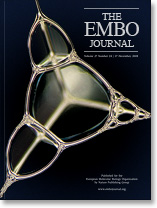 Journals published by the European Molecular Biology Organization (EMBO) have retracted a handful of figures in two papers with the same last and first authors.
Journals published by the European Molecular Biology Organization (EMBO) have retracted a handful of figures in two papers with the same last and first authors.
After some figures in the 2005 and 2007 papers were flagged on PubPeer and the authors couldn’t provide the original data, the journals decided to retract parts of the papers, since other data supported the remaining conclusions, according to the Head of Scientific Publications at EMBO.
The partial retractions are labeled as corrigenda by the journals. Earlier this year, the U.S. National Library of Medicine (NLM) announced it would be classifying partial retractions as errata, noting they had been used so rarely by journals.
Both lengthy corrigenda (also reported by Leonid Schneider) contain statements from the authors and the editors. The statements from the authors provide detailed explanations about the problems with the figures in question; here’s an excerpt from the editor’s statement in The EMBO Journal corrigendum: Continue reading EMBO journals retract figures in two papers missing source data






